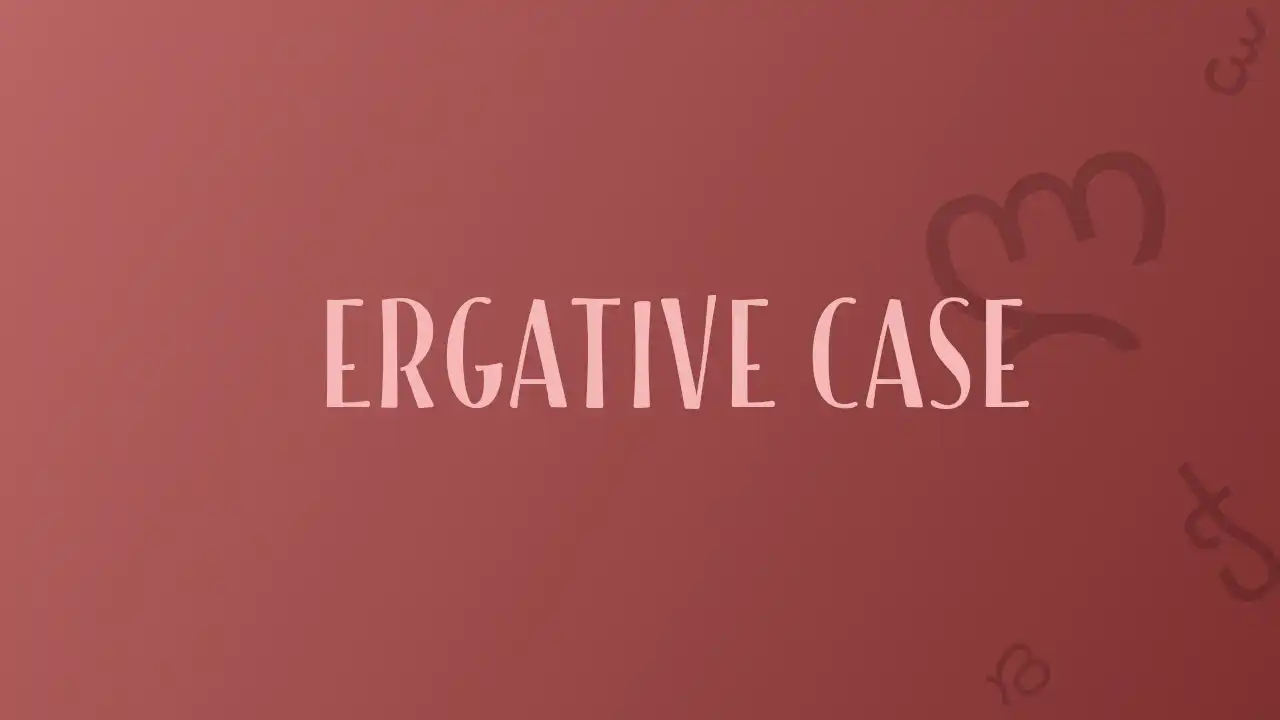The Georgian Ergative Case Explained

Written by

Hello, language learners! Irakli here, from Talk In Georgian.
If you’ve started learning Georgian, you’ve probably heard whispers of something called the “ergative case”. It sounds complicated, and it’s one of those grammar points that can make your head spin.
But don’t worry. As someone who has spent years breaking down Georgian for learners, I can tell you it’s not as scary as it sounds. The key is to forget how English works for a moment and look at it with fresh eyes.
My goal with this guide isn’t to give you a long, boring university lecture. It’s to give you a simple, straight-to-the-point explanation so you can finally say “Aha!” and understand how to use it.
The simplest explanation is this: The ergative case is a special ending you add to the subject of a sentence, but only when the verb is transitive (has a direct object) and is in a specific past tense.
That’s the core rule. Now, let’s break it down.
Table of Contents:
What is the ergative case, really?
In English, the subject of a sentence always looks the same.
- The student reads a book.
- The student read a book.
”The student” doesn’t change, whether the action is happening now or in the past. We know who is doing the reading because of the word order.
Georgian is different. It uses a system of cases - special endings on nouns - to show what role each word plays in the sentence. You probably already know the nominative case (the basic dictionary form of a word) and the dative case (used for indirect objects, and sometimes direct objects).
The ergative case is just another one of these tools. Its only job is to mark the person or thing that performed an action in the past. Think of it as a little flag that says, “Hey! This guy did something!”
This type of system, where the subject of a transitive verb gets a special marking, is called an “ergative-absolutive” system. But you don’t need to remember that fancy name. Just remember that Georgian changes the subject’s ending depending on the tense.
The golden rule: when to use the ergative case
This is the most important part. There are two conditions that must both be true for you to use the ergative case on the subject.
Ask yourself these two questions:
- Does the verb have a direct object? (In other words, is it a transitive verb?). Can you ask “what?” or “whom?” after the verb? For example, “to build” is transitive because you build something. “To sleep” is not, because you don’t sleep something.
- Is the sentence in the aorist past tense? This is the simple past tense in Georgian, used for completed actions (e.g., “he built,” “she wrote,” “they saw”). It’s what linguists call “Series II screeves.”
If the answer to both questions is YES, then the subject goes into the ergative case.
If the answer to either question is NO, the subject stays in the normal nominative case.
Let’s see this in action:
- Present Tense + Transitive Verb:
კაცი აშენებს სახლს.(The man builds a house.) -> No ergative. The subjectკაცი(katsi) is nominative. - Past Tense + Intransitive Verb:
კაცი მუშაობდა.(The man worked.) -> No ergative. The verb has no object. - Past Tense + Transitive Verb:
კაცმა ააშენა სახლი.(The man built a house.) -> BINGO! Both conditions are met. The subjectკაცმა(katsma) is in the ergative case.
This is the whole secret. It’s a two-part lock, and you need both keys to open the ergative door.
How to form the ergative case
Luckily, forming the ergative case is pretty simple. The ending is almost always a version of -მ (-m).
Here are the basic rules:
- If a noun ends in a vowel like -a or -e, you just add -მ (-m).
- If a noun ends in a consonant, you add -მა (-ma).
- If a noun ends in -i, the
-iusually drops and you add -მა (-ma).
Let’s look at a few examples.
| Nominative Case (The basic form) | Ergative Case (The “doer” in the past) | English |
|---|---|---|
| სტუდენტი (studenti) | სტუდენტმა (studentma) | student |
| კაცი (katsi) | კაცმა (katsma) | man |
| ძაღლი (dzaghli) | ძაღლმა (dzaghlma) | dog |
| დედა (deda) | დედამ (dedam) | mother |
| მარიამი (mariami) | მარიამმა (mariamma) | Mariam |
As you can see, you just tack the ending on. With a little practice, you’ll get a feel for when to drop the final vowel.
Putting it all together: sentence examples
The truly mind-bending part of the ergative case is what happens to the object. When the subject switches to the ergative case, the direct object switches to the nominative case (its basic dictionary form).
Look at this shift between the present and past tense.
Present Tense
- Subject: Nominative (
-i) - Object: Dative (
-s)
სტუდენტი წერს წერილს.
Past Tense (Aorist)
- Subject: Ergative (
-ma) - Object: Nominative (no ending)
სტუდენტმა დაწერა წერილი.
Did you see that? The roles flipped!
studenti->studentmatserils->tserili
This is the “ergative shift” in Georgian. Here’s a table to make it crystal clear:
| Tense | Subject Case | Object Case | Georgian Sentence |
|---|---|---|---|
| Present | Nominative | Dative | Katsi ashenebs sakhls. (The man builds a house.) |
| Past (Aorist) | Ergative | Nominative | Katsma aashena sakhli. (The man built a house.) |
Here’s one more example:
ძაღლი ჭამს ხორცს.
ძაღლმა ჭამა ხორცი.
A note on regional variations
The ergative case is a core feature of the Georgian language, and this rule applies across all dialects, from Kakheti to Adjara. While pronunciation and some vocabulary might change from region to region, the fundamental grammar of the ergative case remains the same. It’s one of the solid rocks of the language.
Summary
That’s it! You’ve cracked the code. The ergative case isn’t a monster hiding under the bed; it’s just a different way of organizing a sentence.
Let’s review the key points:
- The ergative case marks the subject of a sentence.
- You only use it when the verb has a direct object…
- …and the verb is in the aorist (simple past) tense.
- When the subject becomes ergative (
-ma), the object becomes nominative (basic form).
It will feel strange at first. Your English-speaking brain will fight it. But every time you read or write a sentence in the past tense in Georgian, check for those two conditions. With practice, it will start to feel natural.